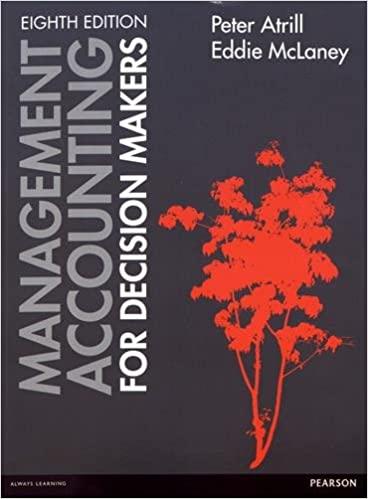11.8 Goliath plc is a food wholesaler. The most recent financial statements of the business are as...
Question:
11.8 Goliath plc is a food wholesaler. The most recent financial statements of the business are as follows:
Income statement for the year to 31 May
£000 £000 Sales revenue 2,400.0 Cost of sales Opening inventories 550.0 Purchases 1,450.0 2,000.0 Closing inventories ( 560.0 ) ( 1,440.0 )
Gross profit 960.0 Administration expenses (300.0)
Selling expenses ( 436.0 )
Operating profit 224.0 Interest payable ( 40.0 )
Profit before taxation 184.0 Taxation (25%) ( 46.0 )
Profit for the period 138.0 Statement of financial position as at 31 May
£000 Non-current assets Property, plant and equipment 456.4 Current assets Inventories 560.0 Trade receivables 565.0 Cash at bank 36.4 1,161.4 Total assets 1,617.8 Equity
£1 ordinary shares 200.0 Retained earnings 520.8 720.8 Non-current liabilities Borrowings – loan notes 400.0 Current liabilities Trade payables 451.0 Taxation 46.0 897.0 Total equity and liabilities 1,617.8 All sales and purchases are made on credit.
The business is considering whether to grant extended credit facilities to its customers.
It has been estimated that increasing the settlement period for trade receivables by a further 20 days will increase the sales revenue of the business by 10 per cent. However, inventories will have to be increased by 15 per cent to cope with the increased demand.
It is estimated that purchases will have to rise to £1,668,000 during the next year as a result of these changes. To finance the increase in inventories and trade receivables, the business will increase the settlement period taken from suppliers by 15 days and use a loan facility bearing a 10 per cent rate of interest for the remaining balance.
If the policy is implemented, bad debts are likely to increase by £120,000 a year and administration costs will rise by 15 per cent.
Required:
(a) Calculate the increase or decrease to each of the following that will occur in the forthcoming year if the proposed policy is implemented:
(i) operating cash cycle (based on year-end figures)
(ii) net investment in inventories, trade receivables and trade payables (iii) profit for the period.
(b) Should the business implement the proposed policy? Give reasons for your conclusion.
Step by Step Answer:

Management Accounting For Decision Makers
ISBN: 9781292072432
8th Edition
Authors: Dr Peter Atrill, Eddie McLaney





